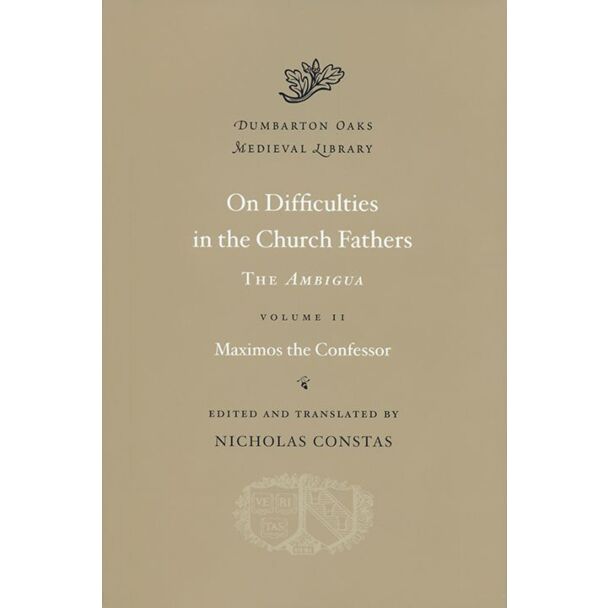On Difficulties in the Church Fathers׃ The Ambigua, Volume II
Maximos the Confessor
Edited and Translated by Nicholas Constas
Edited and Translated by Nicholas Constas
Publication Data: Cambridge, MA/London, United Kingdom: Harvard University Press, 2014
Format: hardcover
Number of Pages: 388
Dimensions (l × w × h): 21.0 cm × 14.0 cm × 2.4 cm
Additional Information: dust jacket, one bookmark ribbon
ISBN: 978‒0‒674‒73083‒0
Maximos the Confessor
Edited and Translated by Nicholas Constas
No. 29 of Dumbarton Oaks Medieval Library
Volume II of On Difficulties in the Church Fathers: The Ambigua
“From Saint Gregory’s First Oration On the Son: [‘]For this reason the Monad from the beginning moved toward a dyad and at the Trinity came to a halt.[’] Everything which is moved according to nature is necessarily moved in consequence of a cause, and everything moved in consequence of a cause necessarily also exists in consequence of a cause; and everything that exists and is moved in consequence of a cause necessarily has as the beginning of its being[...]the cause in consequence of which it exists and from which it was initially brought into being; likewise, the end of its being moved is the same cause in consequence of which it is moved and toward which it hastens. Now everything which exists and is moved in consequence of a cause is necessarily also created, and if the end of whatever is moved is the cause in consequence of which it is in motion, this cause is necessarily the same cause in consequence of which it was created and exists. From this it follows that the cause of whatever exists and is moved, in any way at all according to nature, is one single cause encompassing both the beginning and the end, to which everything that exists and is moved owes its existence and motion. For it is an actively efficacious power, [...]and in a divinely fitting manner it both creates (insofar as it is the beginning) the things that exist and sends them forth, and (insofar as it is the end) providentially draws the things that are in motion back to the limit that it has established for them. Now if every being which is moved (which also means that it has been created) exists and is in motion and has been created in consequence of a cause, then whatever does not exist in consequence of a cause is obviously neither created nor moved. For that which does not have a cause of being is not moved at all. If, then, the uncaused is necessarily also unmoved, it follows that the Divine is unmoved, insofar as it does not owe its being to a cause, being itself the cause of all beings.”
—“Ambiguum 23”
CONTENTS
Ambigua to John, 23–71
Abbreviations
Note on the Text
Notes to the Text
Notes to the Translation
Bibliography
Index
Format: hardcover
Number of Pages: 388
Dimensions (l × w × h): 21.0 cm × 14.0 cm × 2.4 cm
Additional Information: dust jacket, one bookmark ribbon
ISBN: 978‒0‒674‒73083‒0
Maximos the Confessor
Edited and Translated by Nicholas Constas
No. 29 of Dumbarton Oaks Medieval Library
Volume II of On Difficulties in the Church Fathers: The Ambigua
“From Saint Gregory’s First Oration On the Son: [‘]For this reason the Monad from the beginning moved toward a dyad and at the Trinity came to a halt.[’] Everything which is moved according to nature is necessarily moved in consequence of a cause, and everything moved in consequence of a cause necessarily also exists in consequence of a cause; and everything that exists and is moved in consequence of a cause necessarily has as the beginning of its being[...]the cause in consequence of which it exists and from which it was initially brought into being; likewise, the end of its being moved is the same cause in consequence of which it is moved and toward which it hastens. Now everything which exists and is moved in consequence of a cause is necessarily also created, and if the end of whatever is moved is the cause in consequence of which it is in motion, this cause is necessarily the same cause in consequence of which it was created and exists. From this it follows that the cause of whatever exists and is moved, in any way at all according to nature, is one single cause encompassing both the beginning and the end, to which everything that exists and is moved owes its existence and motion. For it is an actively efficacious power, [...]and in a divinely fitting manner it both creates (insofar as it is the beginning) the things that exist and sends them forth, and (insofar as it is the end) providentially draws the things that are in motion back to the limit that it has established for them. Now if every being which is moved (which also means that it has been created) exists and is in motion and has been created in consequence of a cause, then whatever does not exist in consequence of a cause is obviously neither created nor moved. For that which does not have a cause of being is not moved at all. If, then, the uncaused is necessarily also unmoved, it follows that the Divine is unmoved, insofar as it does not owe its being to a cause, being itself the cause of all beings.”
—“Ambiguum 23”
CONTENTS
Ambigua to John, 23–71
Abbreviations
Note on the Text
Notes to the Text
Notes to the Translation
Bibliography
Index
Write Your Own Review






